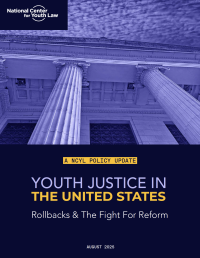Sentenced To Life For A Crime Committed At Age 14, Adolfo Davis Seeks Clemency
By Fiza Quraishi
Adolfo Davis was sentenced to life in prison without parole for a crime he committed at age 14. Now, advocates for Adolfo, who has languished in prison for two decades, are pushing Illinois Governor Pat Quinn to grant clemency in his case.
In 1990 Adolfo Davis received a mandatory sentence of life without the possibility of parole after Adolfo was ordered by two older gang members to participate in what he believed would be a non-lethal robbery. The two gang members ended up shooting and killing two people in the robbery. Adolfo, who didn’t shoot anyone, got life without parole solely for participating in the robbery.
On April 12, 2012, Adolfo’s lawyers and supporters – including one of the robbery victims, a pastor who has known him for over 20 years, and a therapist who worked in the prison where Adolfo was held and counseled Adolfo – made a plea for clemency in front of the Illinois Prisoner Review Board. A state representative, a former federal judge, and the Cardinal of Chicago submitted letters in his support. Adolfo seeks a reduction to time served or, at the very least, a set date for his release.
Adolfo grew up in an environment of extreme poverty, violence, and neglect. His mother was addicted to drugs and marginally involved in his life. He lived in a dirty, overcrowded house, raised by a grandmother who was busy caring for a bed-ridden husband, a mentally disabled son, and several grandchildren.
When Adolfo was 8, the Department of Children and Family Services (DCFS) began documenting the poverty and neglect Adolfo had experienced. DCFS noted as well the effects those conditions had on him: self-harming behaviors, difficulty sleeping, bed-wetting, headaches, and nightmares. Still, DCFS failed to intervene effectively.
Prior to the robbery, Adolfo’s record consisted of a few petty offenses; left to fend for himself, he stole food and small amounts of money to pay for food. Because of Illinois’s sentencing scheme, which requires a mandatory sentence of life without parole for murders committed under certain circumstances, the judge in Adolfo’s case was barred from taking into account any mitigating factors during the sentencing phase.
Now 35, Adolfo has spent more than 20 years in prison. He’s a very different person than that confused 14-year-old. Though he was just a child and had little choice but to follow his gang leaders’ orders, Adolfo feels remorse and accepts full responsibility for making the decision to participate in a crime in which two people lost their lives.
Adolfo has completed his GED and written a book of poetry. He also mentors youth through Precious Blood Ministries, trying to help them avoid the same mistakes he made. “The Governor should act now, and not wait for the courts and years of litigation to give Adolfo relief,” says Patricia Soung, supervising attorney for Adolfo’s defense team and former NCYL staff attorney. “Adolfo has already approached court after court for two decades without success. He assumes responsibility for the part he played in a tragic shooting, but it remains true that he was very young, desperately needed sustenance and support, and played a more minor role in his offense. Over the past 20 years, he has proven himself repentant, matured, and safe for release.”
Adolfo is one of 79 people nationwide who have received life without parole sentences for crimes committed when they were 14 or younger. In March 2012, the US Supreme Court heard oral arguments in Jackson v. Hobbs and Miller v. Alabama, two cases that have challenged the constitutionality of sentencing juveniles convicted of homicide to life without parole. The facts in Hobbs are very similar to those in Adolfo’s case: Hobbs received a mandatory life without parole sentence for a murder that occurred when he was 14, despite the fact that Hobbs did not kill anyone and had no intention of doing so.
A favorable decision in Jackson and Miller gave Adolfo’s legal team another way of challenging his sentence. Meanwhile, the decision on clemency is left to Governor Quinn.
Fiza Quraishi is a staff attorney at NCYL, working on juvenile justice issues.





